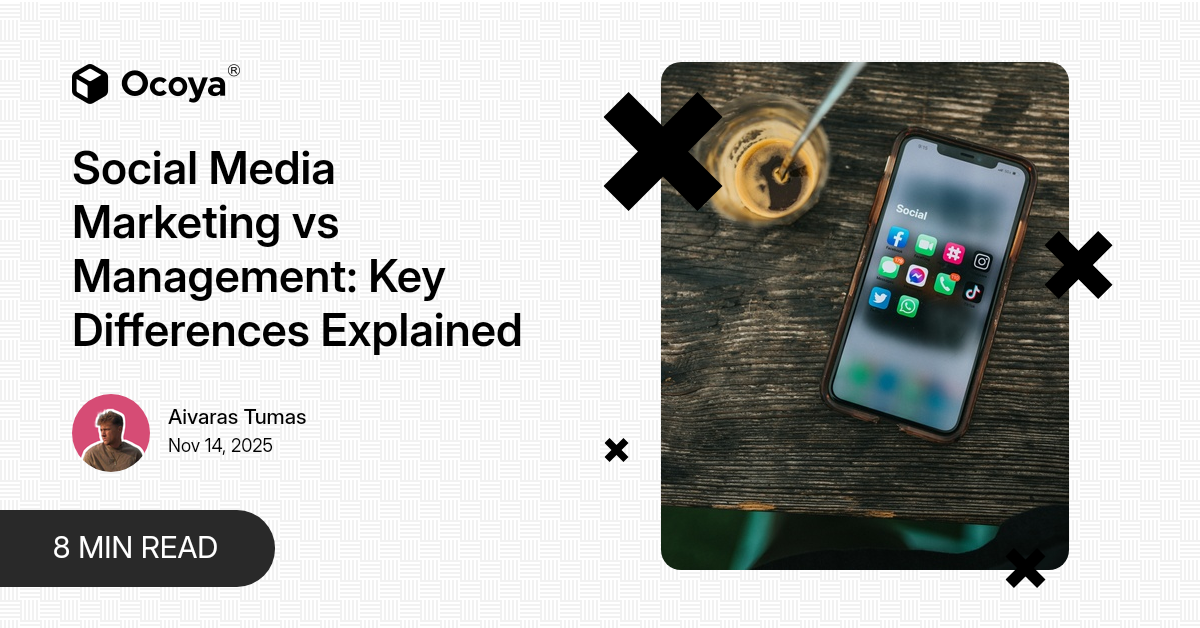
November 14, 2025
Marketing
Social Media Marketing vs Management: Key Differences Explained

In the ever-evolving world of social media, terminology can often become a tangled web of overlapping concepts, making it difficult to distinguish between different roles and strategies. Two terms that are frequently used interchangeably but have distinct meanings are "social media marketing" and "social media management". Understanding the difference between these two is crucial for businesses looking to leverage their social media presence effectively.
What is Social Media Marketing?
Social media marketing is a subset of digital marketing that focuses specifically on the use of social media platforms to promote a brand, product, or service. The primary goal is to increase brand awareness, drive traffic to a website, and generate leads or sales. Social media marketing involves various strategies and tactics designed to engage current followers and attract new ones.
The essence of social media marketing lies in creating and sharing content that resonates with your target audience. This can include a variety of content types, such as promotional posts, engaging visuals, videos, infographics, and even interactive content like polls and quizzes. A successful social media marketing strategy often involves paid advertising to maximize reach and engagement.
Key Aspects of Social Media Marketing
Successful social media marketing hinges on several critical factors:
Content Creation: The backbone of any social media marketing campaign is high-quality, engaging content. This could range from blog posts and videos to memes and infographics. The content should be tailored to the specific platform and audience.
Audience Targeting: Knowing your target audience is essential. Effective social media marketing involves identifying and understanding the demographics, interests, and behaviors of your ideal customers to create tailored marketing messages.
Social Media Advertising: Paid advertisements on platforms like Facebook, Instagram, and LinkedIn allow businesses to reach a broader audience. These ads can be highly targeted based on various parameters, ensuring that your message reaches potential customers who are most likely to convert.
Engagement and Interaction: Social media marketing is not just about broadcasting messages; it’s also about interaction. Engaging with your audience through comments, likes, shares, and direct messages can build a community and foster brand loyalty.
Analytics and ROI Tracking: Measuring the effectiveness of your social media marketing efforts is crucial. Using analytical tools, you can track various performance metrics such as engagement rates, click-through rates, conversion rates, and return on investment (ROI).
What is Social Media Management?
While social media marketing focuses on promoting a brand and generating leads, social media management is the process of overseeing and maintaining a company's social media presence. This role is more operational and involves day-to-day activities to ensure a consistent and cohesive presence across various social media platforms.
Social media management includes tasks like content planning, scheduling posts, responding to comments, and monitoring social media trends. It ensures that a brand remains active and responsive on social media, thus maintaining the health of its online community.
Key Aspects of Social Media Management
A successful social media management strategy should cover:
Content Calendar: Developing a content calendar helps in planning and organizing when and what to post. It provides a clear roadmap, ensuring that content is published consistently and in alignment with marketing goals.
Scheduling Posts: Tools like Hootsuite, Buffer, and Ocoya are invaluable for scheduling posts in advance. This ensures that your social media accounts remain active, even when you're offline or busy with other tasks.
Community Management: Responding to comments, messages, and mentions is vital in social media management. It helps in building relationships with your audience and improving customer satisfaction.
Performance Monitoring: Monitoring metrics such as follower growth, engagement rates, and sentiment analysis helps in assessing the effectiveness of your social media activities. This data is crucial for making informed decisions and adjustments to your strategy.
Trend Tracking: Staying updated with the latest social media trends and platform updates is essential. Social media managers need to adapt their strategies to keep up with changes in algorithms, new features, and emerging trends.
The Synergy Between Social Media Marketing and Management
While social media marketing and management have distinct roles and responsibilities, they are inherently interconnected and complementary. Both are essential for a robust social media presence, and neither can be fully effective without the other.
Social media marketing is about the strategic side – what to post, when to post, and how to engage your audience to drive specific outcomes. It's akin to the creative force that pushes out content and draws attention. On the other hand, social media management is about the operational side – ensuring that everything runs smoothly, the brand's voice remains consistent, and engagement with the community is maintained. It's the glue that holds the social media presence together.
For example, a social media marketing campaign might involve creating a series of engaging posts, advertisements, and videos. However, without effective management, these posts may not be published at optimal times, comments and messages from potential customers could go unanswered, and the overall engagement might suffer. Conversely, excellent social media management without a strong marketing strategy results in a well-maintained but lackluster social media presence that fails to drive significant results.
Key Differences Between Social Media Marketing and Social Media Management
To further clarify the distinctions, let’s delve into some of the key differences between social media marketing and social media management:
Objectives: The primary goal of social media marketing is to promote the brand and drive sales or leads. Social media management, on the other hand, aims to maintain an active and engaging social media presence.
Focus Areas: Social media marketing is more focused on content creation, advertising, and analytics. Social media management focuses on content planning, scheduling, community building, and performance monitoring.
Approach: Marketing tends to be more strategic and campaign-oriented, whereas management is more operational and day-to-day.
Metrics: Marketing success is often measured by metrics like ROI, click-through rates, and conversions. Management success is gauged by metrics like follower growth, engagement rates, and overall account health.
Integrating Social Media Marketing and Management for Maximum Impact
To harness the full potential of your social media efforts, it’s essential to integrate both marketing and management seamlessly. This synergy ensures that your messaging is not only creative and impactful but also consistent and well-maintained.
Here are some tips to effectively integrate both:
Create a Unified Strategy: Develop a comprehensive social media strategy that encompasses both marketing and management. This ensures that both efforts are aligned with your overall business goals.
Use Collaborative Tools: Tools like Ocoya can be incredibly useful in streamlining your social media workflows. Ocoya integrates AI-powered content creation, scheduling, and analytics under one roof, making it easier to manage both marketing and management activities seamlessly.
Regularly Review and Adjust: Social media is dynamic, and what works today might not work tomorrow. Regularly review your performance metrics and be willing to adjust your strategies to stay relevant and effective.
Foster Communication: Ensure that your marketing and management teams (or individuals) communicate regularly. This fosters collaboration and ensures that everyone is on the same page.
Conclusion
In today’s digital landscape, understanding the difference between social media marketing and social media management is crucial for any business looking to succeed on social media. While marketing focuses on the creative and strategic aspects of promoting your brand, management ensures that your social media presence is maintained and nurtured. Both are essential and need to work in harmony to achieve the best possible results.
If you're looking to streamline your social media efforts, consider using a comprehensive tool like Ocoya. Ocoya's AI-powered platform offers solutions for content creation, scheduling, and analytics, making it an invaluable asset for both social media marketing and management. Sign up for a free trial and elevate your social media game today.
Key Takeaways
Understand the roles: Social media marketing focuses on promotion, while social media management handles day-to-day operations.
Create engaging content: High-quality content is crucial for successful marketing.
Maintain consistency: A content calendar and scheduling tools help keep your social media presence active.
Engage with your audience: Interaction builds community and fosters brand loyalty.
Measure performance: Use analytics to track your success and adjust strategies accordingly.
Utilize comprehensive tools: Platforms like Ocoya streamline both marketing and management efforts for optimal results.

Continue Reading
The latest handpicked blog articles.



.svg)

.svg)







